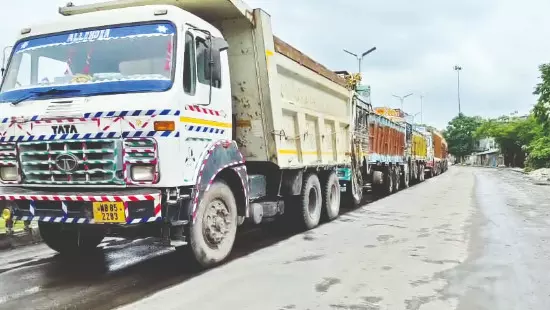Flow of cross-border trade hit with ban on import from B’desh

Cooch Behar/ South Dinajpur: The Central government’s decision to ban the import of specific goods from Bangladesh has started affecting operations at the Changrabandha Land Port in Cooch Behar district. The impact was visible since Sunday morning, disrupting the usual flow of cross-border trade.
Changrabandha has long served as a vital gateway for trade between India, Bangladesh and Bhutan. On an average, around 90 trucks carrying goods from Bangladesh enter India and Bhutan daily through this port. With the new restrictions in place, concerns are growing among local traders, transporters and port workers who depend heavily on this trade.
While import activities have come to a halt, exports from India to Bangladesh continue to be unaffected. Commenting on the situation, a section of traders said: “First the country, then trade. Whatever is in the nation’s interest must be followed.”
Saddam Hossain, a leader of the Changrabandha Workers’ Organisation, added: “The livelihoods of many in Changrabandha depend on this port. People will be affected to some extent, but we hope the government will come up with alternative arrangements soon.”
According to a notification issued by the Directorate General of Foreign Trade (DGFT) under the Union Ministry of Commerce and Industry on Saturday, the import of Bangladesh ready-made garments will now be restricted to only two ports — Kolkata and Mumbai (Nhava Sheva). Imports of such goods will no longer be allowed through any land ports in eastern and northeastern India.
Additionally, the government has imposed a ban on the import of several other items from Bangladesh, including cotton, processed food products, fruits, and plastic goods. These items will not be permitted through customs checkpoints in Assam, Tripura, Meghalaya or Mizoram.
However, they clarified that there are no restrictions on using Indian routes for exporting these goods to third countries like Nepal or Bhutan.
Meanwhile, the ongoing political instability in Bangladesh has severely affected cross-border trade at the Hili Land Port, on the India-Bangladesh border. Exports of several essential commodities, including rice and potatoes, have been suspended, leading to mounting losses for Indian exporters.
What was once a hub of bustling trade, with around 200 trucks carrying goods daily into Bangladesh, is now witnessing a sharp decline. Currently, only 15 to 20 trucks are crossing the border each day, according to port authorities. Exporters report that around 30 categories of goods, such as rice and wheat, are no longer being shipped, while only 7 to 10 items — including cumin, seed grains and bleaching powder — are being sent in very limited quantities.
Traders at Hili Land Port, who once conducted business worth Rs 25 to 30 crore daily, are now managing a reduced trade volume of just Rs 5 to 8 crore per day. The slowdown began following the fall of the Sheikh Hasina government in August last year.
Bhaskar Raut, Superintendent of the Hili Customs Office, echoed these concerns, saying: “Export trade has hit rock bottom.”



